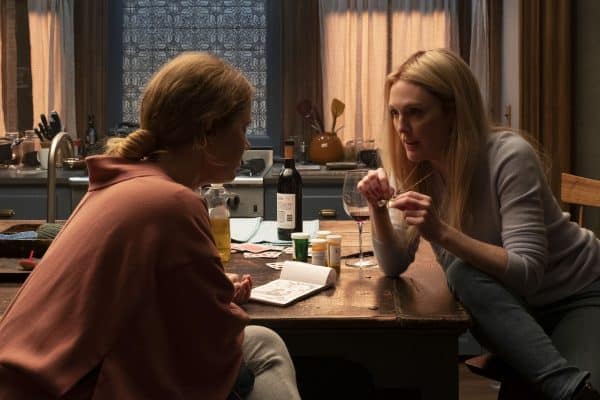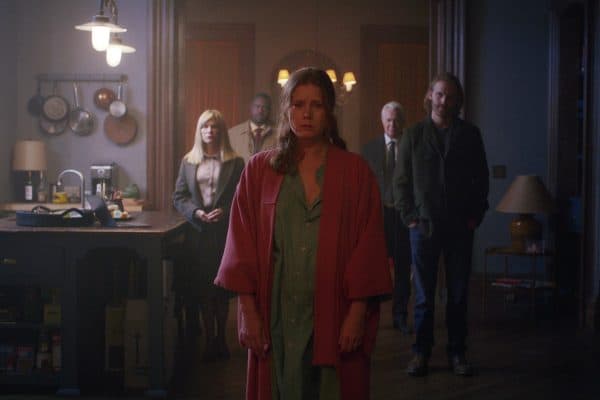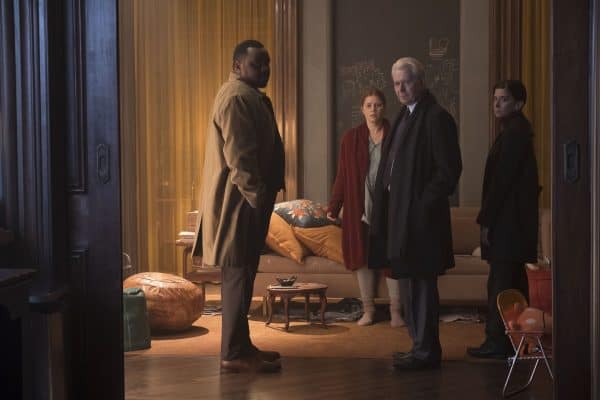The Woman in the Window, 2021.
Directed by Joe Wright.
Starring Amy Adams, Gary Oldman, Julianne Moore, Anthony Mackie, Brian Tyree Henry, Jennifer Jason Leigh, Fred Hechinger, Wyatt Russell, Jeanine Serralles, Mariah Bozeman, Liza Colón-Zayas, Anna Cameron, and Tracy Letts.
SYNOPSIS:
An agoraphobic woman living alone in New York begins spying on her new neighbors, only to witness a disturbing act of violence.
As a director and screenwriter, Joe Wright and Tracy Letts (with the latter typically adapting stage plays) continue to be unpredictable. One alternates between period pieces and thrillers (and whatever the hell Pan was), whereas the other doesn’t seem to have a preferred wheelhouse either. The fact that they are collaborating for The Woman in the Window (a psychological thriller in the vein of Alfred Hitchcock’s Rear Window, based on the book by A.J. Finn) is alone intriguing enough to watch. You have a filmmaker well-versed in visual language and style working with a playwright (that adapted the button-pushing craziness of Killer Joe) to give the mania and mysterious madness here theatricality. Not to mention, some of the most talented actors working today are in front of the camera.
Yet, after having seen it and contemplating it, I still can’t decide if The Woman in the Window is a colossal misfire for most involved or a clever roundabout way of expressing that those suffering from mental illnesses still deserve to be believed even if something sounds too ridiculous to be true. This is especially true when this person can point to objects and situations that prove some version of the truth is being told. In some respects, it brings to mind last year’s incredible The Invisible Man and the shocking ways people will outright ignore the words from someone they deem crazy. The message gets across as covered in trash, but at least The Woman in the Window is entertaining schlock with a slight purpose. It also happens to be so far-fetched and ludicrous that, depending on the viewer, the good intentions of its themes may evaporate once the bonkers third act begins.
Backing up, Amy Adams is Anna Fox, a former child psychologist now who has agoraphobia at the hands of the tragedy so severe, all the air is sucked out of the room once her own psychologist Karl (Tracy Letts) disapproves of her self-deprecating humor while fresh off of a suicide attempt. Whatever happened now has Anna separated from her husband and daughter (Anthony Mackie and Mariah Bozeman), living alone in a dimly lit and dirty home, often walking around disheveled and unkempt. Think of it as Amy Adams’ physical transformation in Hillbilly Elegy but more restrained and without a southern accent. More concerning, Anna has developed a habit of spying on her neighbors living in the apartment complex across the street.
This includes various people, including religious types, aspiring musicians, and a new family on the block, the Russells. She does occasionally talk to her husband over the phone, but for the most part, Anna is deeply depressed with an anxiety disorder and constantly switching up medications. She’s also occasionally paranoid, under the impression that her psychologist suggests her specific medicine to make her easier to control. Her fear of outside interaction runs so deep she objects when her tenant David (the hotheaded and exceptional at playing immensely unlikable characters, Wyatt Russell) fails at persuading her to at least leave candy outside. Anna reasons that it will just all get stolen by the first child, showing that cynicism is now taking up space in her mind.
However, Anna is open to in-person company, especially as the Russell family introduces themselves one by one. First, the sensitive and possibly on the spectrum teenage Ethan (Fred Hechinger) drops off a gift. Then, the matriarch of the family, Jane, comes over to get acquainted, inevitably striking up a conversation about parenthood while under the influence of some wine. Finally, unsociable Alistair (another late-career Gary Oldman performance that’s screamed through at high-volume, although one that somewhat works here) turns up to ask if his wife or son has stopped by. It’s also established that the family is going through a tumultuous time and that Alastair is most likely abusive. If nothing else, Anna is convinced Ethan could use some child therapy.
And then, late one night while drinking, popping pills, and spending time with her snowball white cat Punch (who often doesn’t want to be around her), Anna is nosy and catches a glimpse of Jane stabbed and bleeding out. She also faints while courageously running outdoors, attempting to rescue Jane, only to awaken back in her home surrounded by a pair of detectives played by Brian Tyree Henry and Jeanine Serralles. They don’t believe her story, and they also have a good reason for not doing so. Although now played by Jennifer Jason Leigh rather than Julianne Moore in the scene where they briefly hang out, Jane is somehow still alive and present.
 From here, The Woman in the Window becomes a game of uncovering what to really going on, all as the aforementioned detectives dismiss any physical evidence. The reason behind that plays into Anna’s trauma, which is interwoven and revealed during a pivotal sequence with a stylistic flourish rather than a generic flashback. It’s easily the strongest segment of the film, considering it allows Amy Adams to elicit feelings. The roles may lack nuance, but the actors are certainly breathing life into this twisty and twisted tale. Basically, Anna has to hold onto her intuition that Ethan is in danger, made abundantly clear in his interactions with Alastair.
From here, The Woman in the Window becomes a game of uncovering what to really going on, all as the aforementioned detectives dismiss any physical evidence. The reason behind that plays into Anna’s trauma, which is interwoven and revealed during a pivotal sequence with a stylistic flourish rather than a generic flashback. It’s easily the strongest segment of the film, considering it allows Amy Adams to elicit feelings. The roles may lack nuance, but the actors are certainly breathing life into this twisty and twisted tale. Basically, Anna has to hold onto her intuition that Ethan is in danger, made abundantly clear in his interactions with Alastair.
Unfortunately, once the narrative is ready to tie everything together, it’s hard to take the feeling that Anna’s character arc is complete. Even during the epilogue, the aftermath feels unearned, as if certain elements of the mental health aspect were always an afterthought. Then there’s the truth of what’s happening, which is somewhere between ludicrous and terrifying, but mostly implausible and stupid. Parts of the showdown itself are also made overtly predictable by the film’s opening, drawing attention to key areas of the home. Once things get loony, it’s just a matter of waiting until the characters get to a certain location.
As a sleazy mystery, The Woman in the Window is sure to satisfy anyone with a Netflix account that can’t decide what to watch on a late weekend night, choosing a disposable thriller; there’s a reason the streaming service bought this one from Disney/Fox. It’s just hard to look past the flimsy characterization failings and not come away sensing the finer details of the novel got lost in favor of focusing on broader appeal. It would also be dishonest to say I didn’t have fun watching The Woman in the Window. Intentional or not, the case is made not to brush off serious concerns coming from those mentally unwell.
Flickering Myth Rating – Film: ★ ★ ★ / Movie: ★ ★ ★
Robert Kojder is a member of the Chicago Film Critics Association and the Critics Choice Association. He is also the Flickering Myth Reviews Editor. Check here for new reviews, follow my Twitter or Letterboxd, or email me at MetalGearSolid719@gmail.com
















